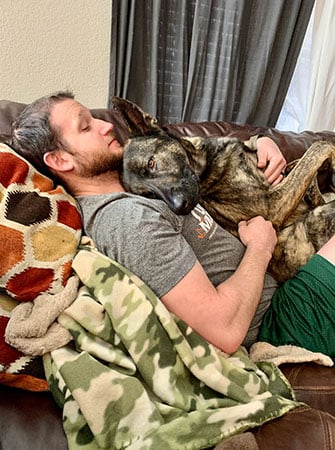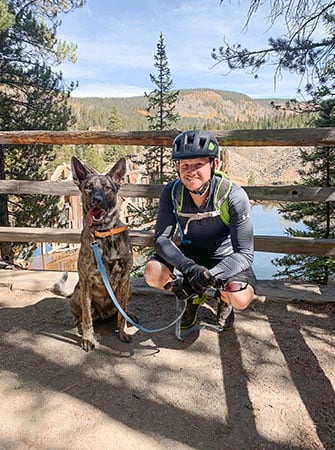Five-year-old Dutch Shepherd Jackson is well known on campus, especially in the classroom, and is considered the unofficial mascot of the University of Colorado College of Nursing UCAN program. As a service dog for soon-to-be BS in Nursing graduate James Damioli, “He goes with me pretty much everywhere,” Damioli says. “He goes to the grocery store, on an airplane, and he’s been to every lecture with me throughout school.”

CU Nursing UCAN student James Damioli and his service dog Jackson relaxing. |
Jackson’s official title is an Epilepsy Service Dog as Damioli was diagnosed with epilepsy a few years ago.
Jackson wears a special collar (and sometimes a vest) when caring for Damioli.
“Initially when we got him, we didn’t intend for him to be a service dog,” Damioli says. Damioli got Jackson from a former co-worker at Denver Health who bred dogs for police departments. His wife noticed Jackson was aware when Damioli was having a seizure and she suggested getting Jackson trained as a service dog.
“After a seizure I’d be confused, wander off, or be unaware of my surroundings,” Damioli says. “Jackson would do things like stop me from walking into the street or falling down the stairs. He even learned bus routes and stops, so if I was confused, he’d get up and be like ‘This is where we need to get off’.”
Damioli will sometimes have memory loss when a seizure happens, so having Jackson around is critical.
“One day, we were riding the bus, and the closest stop was about a mile away from my house,” he says. “At one point I had a seizure, and somehow Jackson got me home from the bus stop. I had no idea it happened, and I showed up at my house. So, in a very real sense he’s saved my life at least once.”
Since that incident, Damioli has had several brain surgeries, including one where a neurostimulator was implanted into his brain to help control his seizures. Jackson is still by his side to detect any additional seizures that might occur.
Choosing CU Nursing |
|
Damioli chose CU Nursing because of the college’s reputation, and he heard positive things about the UCAN program from his co-workers.
“The UCAN program appealed to me because I had some experience and I wanted to get my degree in an accelerated way, not over a couple of years,” he says. “After talking with people who went through the program, they said they felt like they got a good education and they are competent and good nurses.”
He admits he had some anxiety going back to school – and says it was an adjustment jumping into an intense program. He was working at UCHealth when he started the program in January but took a leave of absence in July to help him balance his home life and school.
“My biggest piece of advice to students is to take things one day at a time,” he says. “Instead of looking at it as a big insurmountable program with all of these credit hours and clinicals, break it down. Say to yourself ‘I can do all of these assignments, I know how to write a paper, I can do all of these things’.” |
“He keeps a close eye on me now,” Damioli says. “If we’re out of the house, he’s trained to make all kinds of stops. We’ll look both ways before crossing the street so I don’t get hit by a car, or if we’re on campus he’ll put himself between me and a staircase to make sure I don’t fall.”
Turning to a Career in Nursing
Damioli, an Ohio native, graduated from Tulane University in New Orleans with a degree in psychology and neuroscience in 2010. He worked as a paramedic in New Orleans after college and continued working as a paramedic when he moved to Colorado six years ago.
After he was diagnosed with epilepsy, he couldn’t work in an ambulance, so he started teaching paramedics and eventually got a job in the ER at UCHealth.
“Working with nurses there, I got a better sense of what they did and I realized it was something I wanted to do. I also spent a month in the ICU between my surgeries so I got to see what it means to be a patient. I’ve had a lot of interactions with nurses both as a patient and working as a paramedic.”
Bringing Jackson to School
Damioli says CU Anschutz and CU Nursing have been accommodating with Jackson. When he entered the UCAN program, Damioli met with the CU Anschutz Office of Disability, Access, and Inclusion to go over questions and set up rules for Damioli and Jackson to follow.
“I’ve never had anybody question it,” he says. “Everyone’s been welcoming – both students and faculty, so there’s been no issue. As a courtesy, I’ll send an email to professors to let them know Jackson will be in class because he’s a big dog, but I’ve heard from some professors that they forget he’s there. He’s usually curled up behind my seat so he can keep an eye on me.”
He’s heard from multiple students that Jackson is known as “the class mascot” because he comes to classes and lectures.
“If we’re in the hallway after class, I’ll ‘release’ him – meaning I give him a command so he knows he’s not working, so he can say hi to people,” he says. “People in class love that, especially after our stressful tests and finals, people would come out and ask if they could pet or hug him, so he’s very in-tuned to other people in the class.”
While Jackson goes with Damioli nearly everywhere – one place he doesn’t go to, is clinicals. Damioli says it would have been a distraction, and it would limit the clinicals he could attend because of certain precautions in ORs or ICUs.

CU Nursing UCAN student Damioli and his service dog Jackson hiking. |
“It would also have been a big logistical issue,” Damioli says. “And, some patients don’t react well when seeing a big police-looking dog. Since he’s a big dog, I don’t want him to get hurt if he’s getting in the way of a patient who is upset.”
Plans After Graduation
Damioli recently accepted a job at UCHealth – he’ll be back in the ER, but this time he’ll be a nurse and not a paramedic.
“It’s a big accomplishment to graduate,” he says. “It’s a big part to overcome my condition – because most people with this condition don’t have the opportunity to go back to work, much less doing something that’s a high acuity job like nursing.”
Damioli plans to bring Jackson to the hospital when he’s training or attending meetings but will continue to stay out of the ER. Damioli says outside of work, Jackson will continue staying by his side and keeping an eye on him.
“Before he was a service dog, he bonded with me very quickly, so he’s very attached but it’s in his nature that he wants to take care of me and do things together,” Damioli says. “He’s a very affectionate dog, and he’s affectionate with my wife. He plays with our one-year-old yellow lab, and they’re best friends. When he’s at home, he’s more or less a normal dog.”



